With a complex market and high leverage involved, having the right futures broker is crucial for success.
To help you, we’ve compiled this comprehensive guide comparing the best futures brokers for 2024.
We’ll break down their fees, platforms, features, and customer support so you can confidently choose the one that aligns with your trading style and goals.
Best Futures Brokers of 2024
- NinjaTrader: Low commissions and sophisticated charting tools
- E*TRADE: Flexible pricing structures and extensive market access
- Interactive Brokers: Professional-grade trading tools and low-cost trading options
- Optimus Futures: Best for its customizable trading platform and low day trading margins
- TradeStation: Powerful charting capabilities and promotional offers
1. NinjaTrader
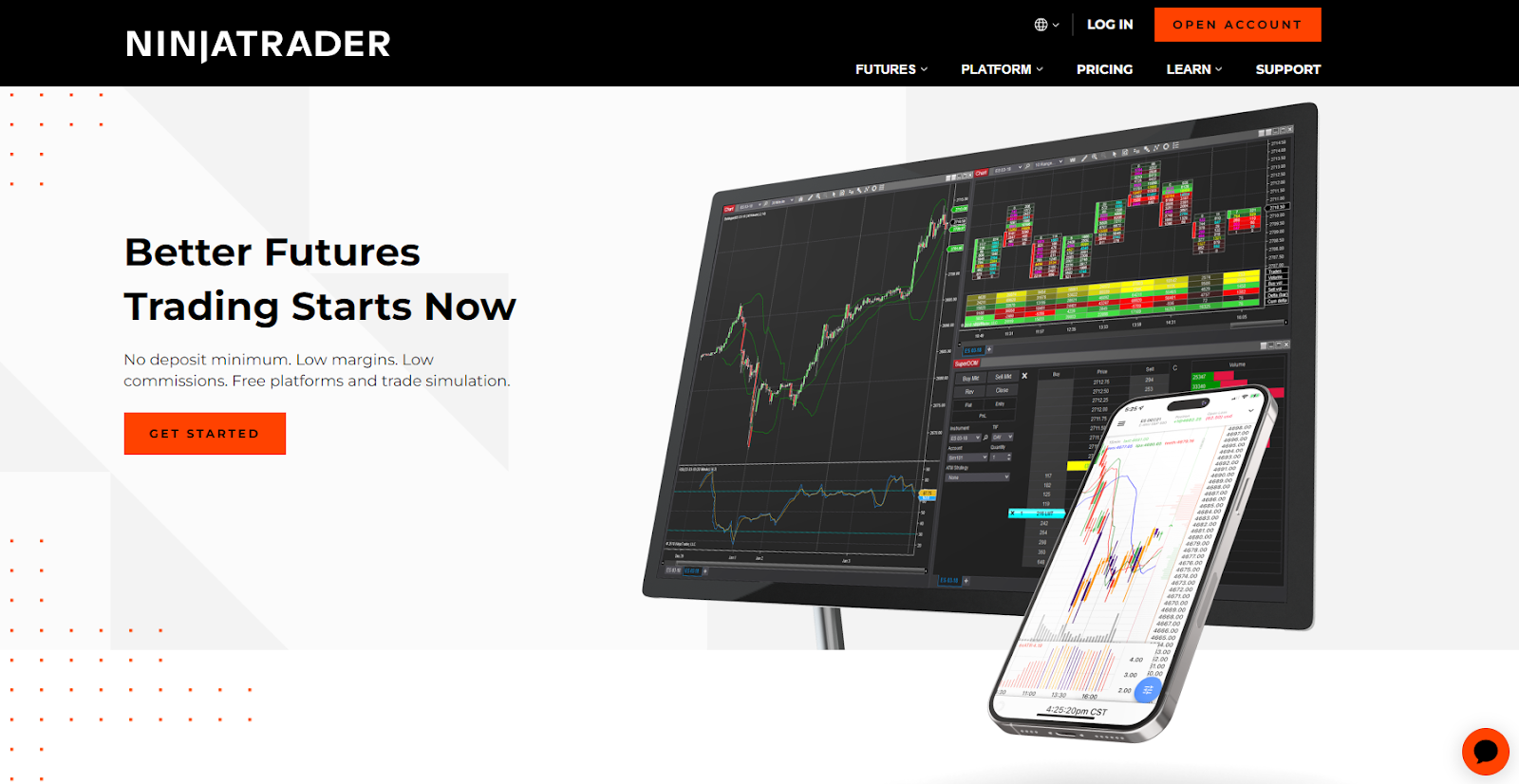
Account Minimums: No minimum deposit is required to open an account with NinjaTrader. However, you’ll need at least $50 in margin to start trading micro-futures contracts and $500 for standard contracts.
Commissions and Fees: NinjaTrader offers three pricing options for commissions. Here’s a breakdown:
| Option | Monthly fee | Commission (per side) |
| Free | $0 | Micro: $0.35, Standard: $1.29 |
| Monthly | $99 | Micro: $0.25, Standard: $0.99 |
| Lifetime | $1,499 (one-time) | Micro: $0.09, Standard: $0.59 |
NinjaTrader doesn’t charge any fees for deposits or ACH withdrawals, but there are fees for wire transfers and other account-related activities, such as currency conversion (1% of funds converted, minimum of 10 units) and outgoing account transfers ($50).
NinjaTrader is a futures trading platform that allows you to access a diverse selection of futures contracts. You can gain exposure to markets such as stock indices (e.g., E-mini S&P 500, E-mini Nasdaq-100), currencies (e.g., Euro FX, Japanese Yen), commodities (e.g., gold, crude oil, natural gas), and more. However, it doesn’t provide trading capabilities for options, which may be a drawback for some traders.
The platform also offers micro-futures contracts, which provide a lower-cost entry point for traders with smaller account sizes.
Its trading platforms are user-friendly and packed with advanced features. They are available on desktop, web, and mobile devices.
The desktop platform offers charting tools to customize indicators, timeframes, and chart styles to suit individual trading strategies. It also features a depth-of-market (DOM) tool known as the SuperDOM, which enables traders to quickly analyze prices, place orders, and manage their positions.
And unlike other futures brokers, NinjaTrader doesn’t charge platform fees. You can use their trading platform for free, which can help reduce your overall trading costs, but you have to set up a funded account with their brokerage.
NinjaTrader provides 24-hour support during the trading week and technical support during weekends.
Pros
Wide range of futures contracts across various asset classes
User-friendly and customizable trading platforms with advanced charting and analysis tools
Low commissions and day-trading margins
24-hour support during the trading week
Simulation mode for risk-free trading practice
There is no minimum deposit requirement to open an account
Integrated desktop, web, and mobile platforms
Cons
Limited to futures trading only (no options or equity trading)
Potential for additional fees, such as inactivity fees or data fees, depending on account type and trading activity
2. E*TRADE
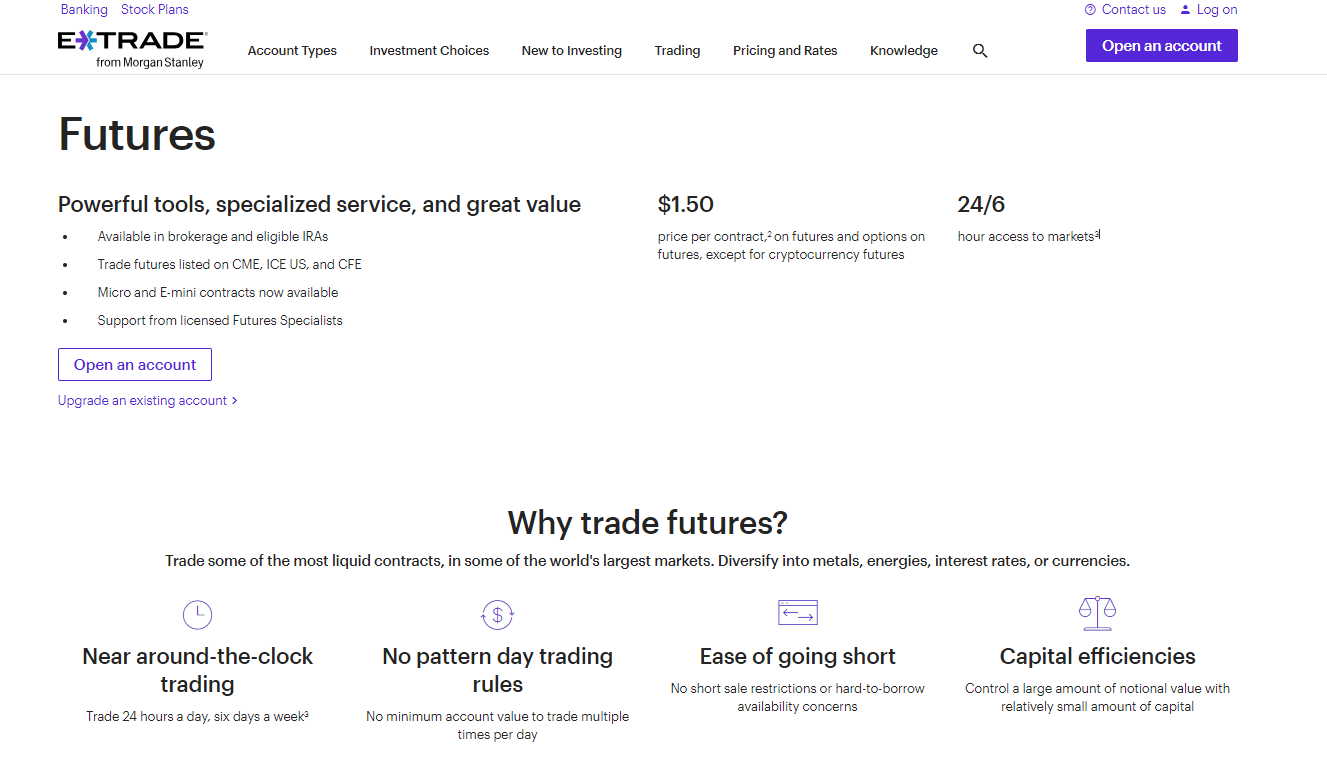
Account Minimum and Fees: No minimum account balance is required to get started.
Commissions and Fees: E*TRADE charges $1.50 per contract, per side, for most futures contracts. However, if you’re interested in trading cryptocurrency futures, the commission is slightly higher at $2.50 per contract per side.
These fees are in addition to any applicable exchange fees.
Margin Requirements: E*TRADE’s margin requirements for futures trading depend on your account type and your holding period. For regular brokerage accounts, day trading futures require a 50% margin, while positions held overnight necessitate a 100% margin.
The margin requirements are higher if you’re trading futures within an Individual Retirement Account (IRA). Day trading futures in an IRA require a 100% margin, and positions held overnight need a 200% margin. This higher margin requirement for IRAs protects retirement savings from the potential risks associated with leveraged trading.
E*TRADE offers a consolidated platform that supports multiple U.S. asset classes, making it convenient for traders to manage their diverse investment portfolios. The company provides desktop, web, and two mobile platforms, all of which are user-friendly and intuitive.
It offers a wealth of content for beginners and experienced traders to trade and learn about markets. While some professional traders may prefer more advanced features, E*TRADE’s platforms provide a solid and comprehensive futures trading experience.
E*TRADE is one of the leading online futures brokers, offering extensive educational materials and user-friendly platforms for futures trading.
One notable feature of E*TRADE’s offering is the support for micro and E-mini contracts. Traders can enter the futures market with smaller positions and lower capital requirements. This is beneficial if you’re a new trader who wants to gain experience without taking on excessive risk.
E*TRADE also has excellent customer support, with licensed Futures Specialists available to assist traders with their needs.
Pros
Easy-to-use platforms suitable for both beginners and experienced traders
Excellent customer support, including dedicated Futures Specialists
Advanced mobile app for trading on the go
Commission-free trades for stocks, options, mutual funds, and ETFs
Support for multiple U.S. asset classes, allowing for a diversified investment portfolio
Comprehensive educational materials and resources
Demo account for practicing trades without risking real money
Free CME Group and CFE data for non-professional traders
Cons
No access to international exchanges, limiting trading opportunities
Higher margin rates for IRA accounts compared to regular brokerage accounts
3. Interactive Brokers
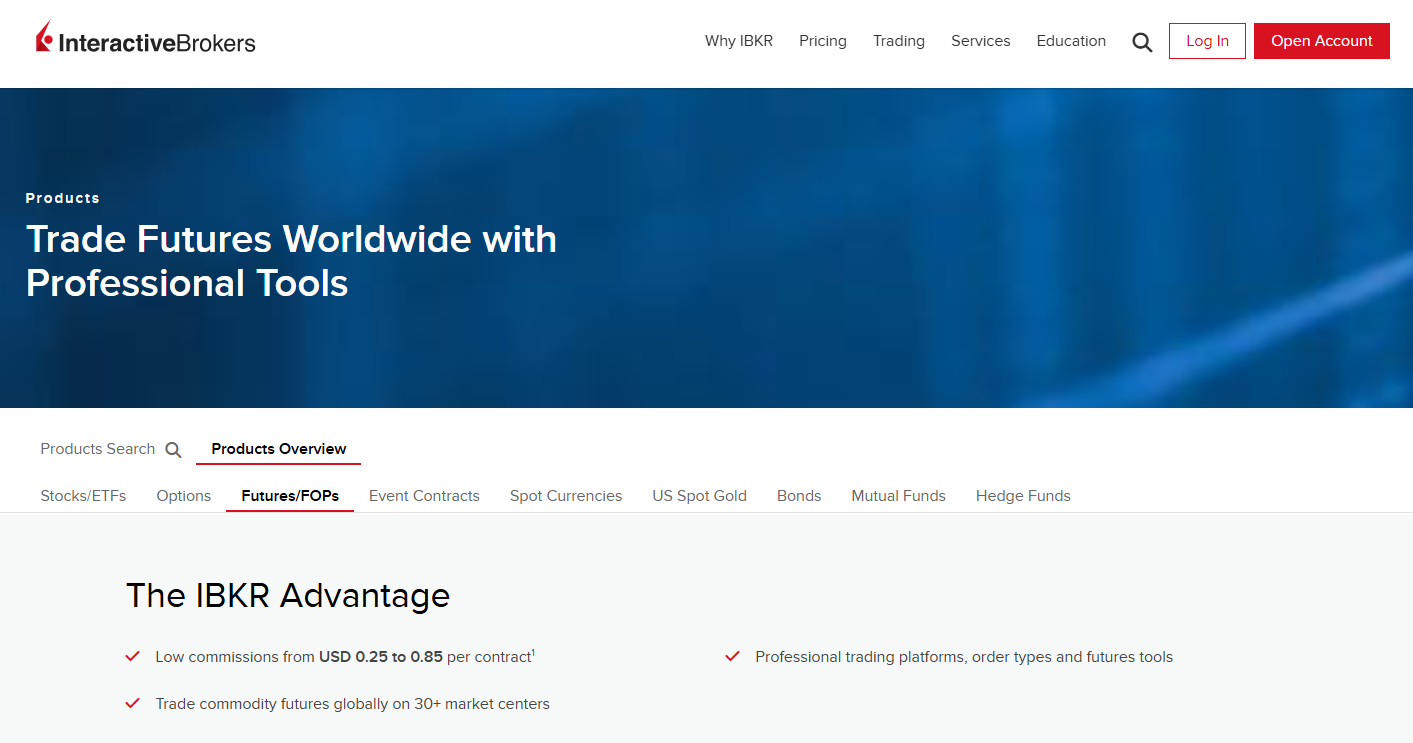
Account Minimum: IBKR doesn’t require a minimum account balance to get started.
Commissions: IBKR offers two pricing plans: IBKR Pro and IBKR Lite. The commissions for futures trading vary depending on the plan and the volume traded. Here’s a breakdown of the commissions:
| Contract Type | IBKR Lite | IBKR Pro |
| Standard Futures | $0.85 per contract | $0.85 to $0.25 per contract (based on volume) |
| Mini Contracts | $0.25 per contract | $0.25 to $0.10 per contract (based on volume) |
| Cryptocurrency Futures | $0.10 to $5 per contract | $0.10 to $5 per contract |
| E-mini FX Futures | $0.50 per contract | $0.50 to $0.05 per contract (based on volume) |
IBKR Pro customers also pay an overnight position fee, and standard exchange and regulatory fees apply to both plans.
Margin Requirements: The minimum margin for intraday positions is $50.
IBKR offers a range of powerful and award-winning trading platforms and tools on desktop, mobile, and web. These platforms allow you to view market data, manage positions, and trade multiple asset classes and products on a single screen.
One of the standout features of IBKR’s offering is the wide variety of order types and algorithmic trading options. With over 100 order types, you can execute complex strategies and manage risk effectively. IBKR also provides tools like ComboTrader for creating proprietary combination order strategies and SpreadTrader for managing future positions seamlessly.
For traders interested in index arbitrage, IBKR’s Index Arbitrage Meter is a valuable tool that measures the spread between futures contracts and their respective spot prices, helping traders identify potential arbitrage opportunities.
IBKR’s platforms also offer advanced features like backtesting trading ideas, sophisticated options analysis tools, and the ability to develop custom trading algorithms using many fundamental and technical indicators. This level of customization and automation appeals to professional traders.
Customer support is available 24/7 via phone, live chat, and email, catering to U.S. and international clients.
Pros
Low commissions and no minimum account balance
Advanced trading tools and customizable platforms
Wide range of order types and algorithmic trading options
Backtesting capabilities and sophisticated options analysis tools
Excellent order execution and routing
Global market access
Improved user experience for beginners and less experienced traders
Cons
The platform may still have a learning curve for new traders
Additional forms may be required for trading in multiple markets
Overnight position fees for IBKR Pro customers
4. Optimus Futures
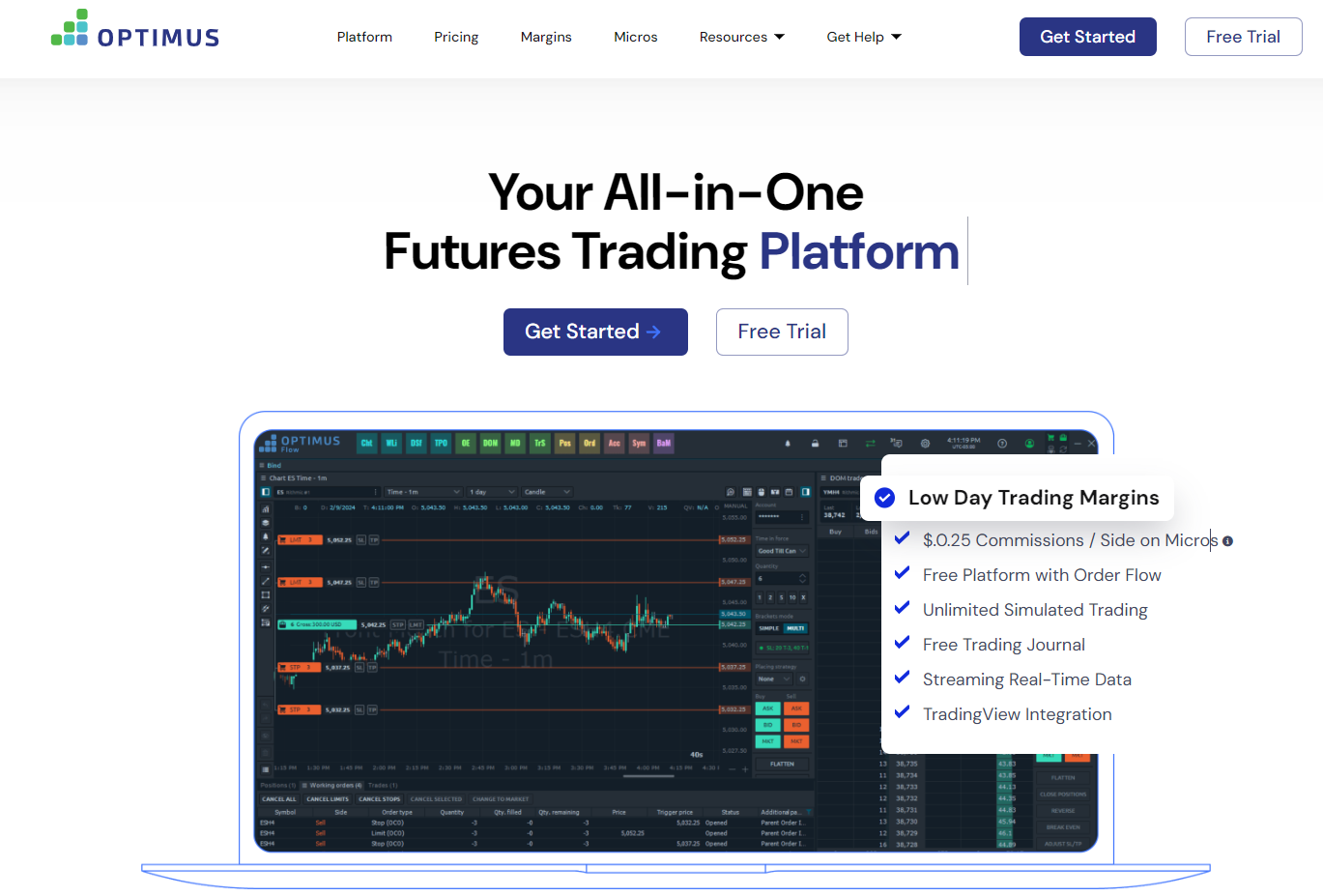
Account minimum: The minimum amount to open an account is $500.
Commissions and Fees: You pay $0.25 per side on micro contracts and $0.75 per side on standard contracts, with no monthly platform fees or hidden charges. Additionally, Optimus Futures offers a volume-based commission tier, allowing frequent traders to benefit from even lower rates.
| Daily Trading Volume | Micro Commissions (per side) | Standard Commissions (per side) |
| 0-20 Contracts | $0.25 | $0.75 |
| 21-100 Contracts | $0.20 | $0.50 |
| 101-500 Contracts | $0.15 | $0.25 |
| 501-1000 Contracts | $0.10 | $0.20 |
| Over 1000 Contracts | $0.05 | $0.10 |
Margin Requirements: Optimus Futures offers competitive day trading margins. For example, the day trading margin for Micro E-mini S&P 500 (MES) and Micro E-Mini Dow Jones (NYM) is as low as $40, while the margin for E-mini S&P 500 (ES) and E-Mini Dow Jones (YM) is $400.
The broker provides access to various futures products, including micro futures, event-based contracts, and global exchange connectivity. You can also explore managed futures, automated trading systems, and CME membership leases through Optimus Futures. To start trading futures, you need to choose a broker, open a futures trading account, sign a margin agreement, get the account approved, and deposit money.
In addition to its competitive commissions, Optimus Futures provides traders with a powerful and feature-rich trading platform called Optimus Flow.
This platform, which is offered free of charge, enhances technical analysis and streamlines order execution. Optimus Flow has charting tools and features, including charts with various chart types and custom time intervals, unlimited charts, indicators, and chart overlays.
Additionally, Optimus Flow supports order flow trading and provides TPO profile charts.
For traders who prefer alternative platforms, Optimus Futures supports a range of popular options, including Optimus Web, Rithmic, TradingView, TrendSpider, Sierra Chart, Bookmap, and ATAS.
Optimus Futures offers various ways to contact its support team. The broker provides a comprehensive “Contact Optimus Futures” section on its website.
Pros
Low commissions and no monthly platform fees
Volume-based commission tiers for frequent traders
Free trading platform with advanced features and tools
Competitive day trading margins
Wide range of futures products and trading services
Additional benefits like free market data and news alerts
Cons
Some additional fees, such as clearing and exchange fees, may apply
Higher commissions may apply for holding positions past the session close
Limited information on commission rates for higher volume tiers
5. TradeStation
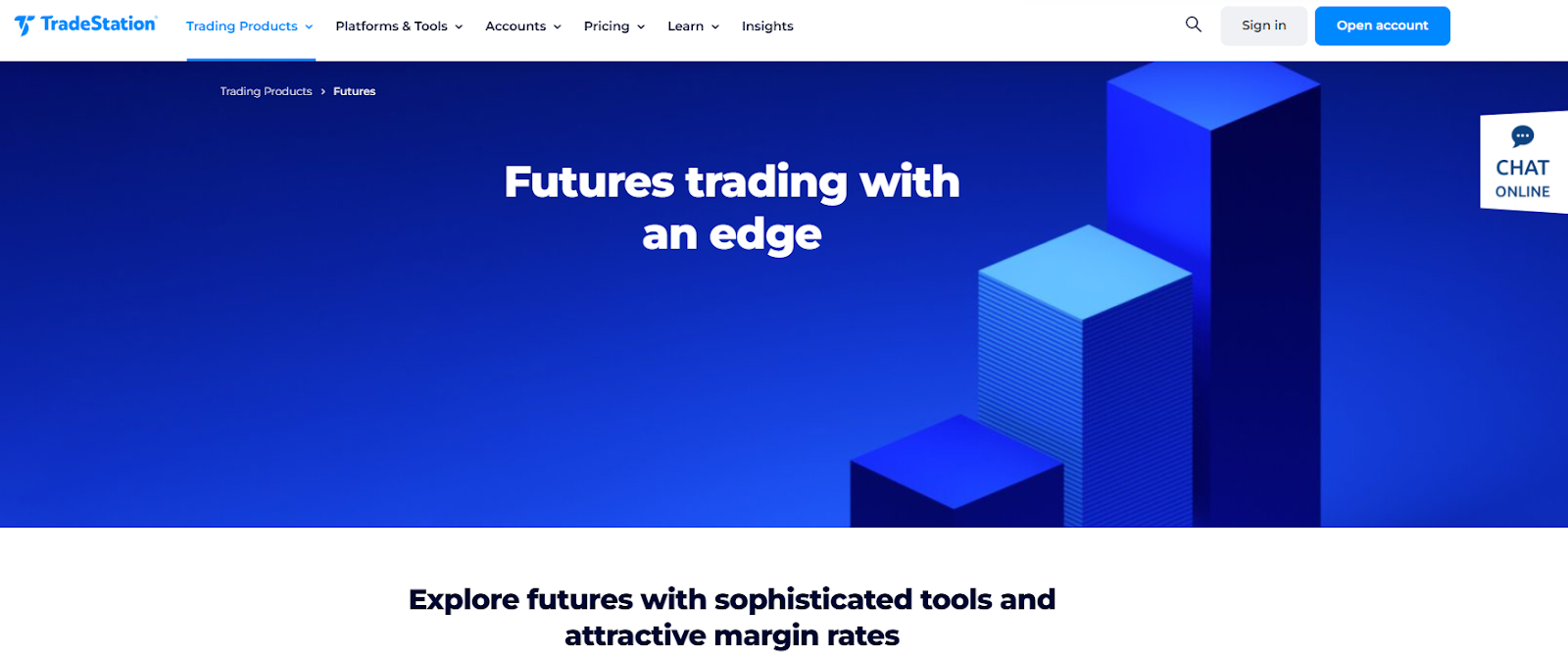
Account Minimum: TradeStation requires a minimum start-of-day equity of $5,000 to open futures options trades on the FuturesPlus platform.
Commissions: TradeStation offers competitive commission rates for futures trading, with a straightforward pricing structure that varies depending on the type of contract traded. Here’s a breakdown of the commissions:
| Contract Type | Commission Structure |
| Standard Futures | $0 Commission + $1.50 per contract, per side |
| Micro Futures | $0 Commission + $0.50 per contract, per side |
| Futures Options | $0 Commission* + $1.50 per contract, per side |
The $0 commission pricing for futures applies to TradeStation’s TS SELECT plan, which is only available to U.S. residents. This means traders on the TS SELECT plan will only pay the per-contract, per-side fee without additional commission charges.
For non-U.S. residents or traders on different pricing plans, commission charges may vary.
Certain market data subscriptions may incur additional charges in addition to the per-contract fees. While some basic market data is free for non-professional subscribers, access to more extensive market data may require extra fees.
TradeStation offers sophisticated trading platforms and tools designed to cater to the needs of both day traders and long-term investors. The broker’s flagship platform, TradeStation Desktop, offers a range of advanced features, including:
EasyLanguage: A proprietary programming language for creating custom indicators and strategies
RadarScreen: A powerful scanning tool for identifying trading opportunities
Advanced charting: Comprehensive charting capabilities with a wide array of indicators and drawing tools
Robust backtesting: The ability to test and optimize trading strategies using historical data
High-speed order entry: Efficient order placement and execution
In addition to the desktop platform, TradeStation provides a web-based trading platform that requires no download and offers features such as simulated trading, extensive historical data for U.S. and Eurex futures, and customizable indicators.
For traders on the go, TradeStation’s mobile apps (available for iOS and Android) provide market analysis, custom price alerts, detailed ordering, and an intuitive interface, allowing users to access futures markets from various exchanges.
TradeStation includes free real-time market data for various futures exchanges, such as CME, CBOT, NYMEX, and COMEX. You can subscribe to additional data packages for enhanced coverage and real-time data from other exchanges like ICE, Eurex, and MGEX.
Its customer support is available during specified hours, depending on the type of assistance required. The Client Experience & Technical Support team is available Monday through Friday, 8:00 a.m. to 5:00 p.m. ET. At the same time, the Trade Desk offers extended hours for futures traders, operating 24 hours from Sunday, 5:00 p.m. to Friday, 6:00 p.m. ET.
You can contact TradeStation’s support team through live chat, phone, and email.
Pros
Competitive commission rates and margin requirements
Access to a wide range of futures contracts across various asset classes
Advanced trading platforms and tools, including EasyLanguage and RadarScreen
Free real-time market data for major U.S. futures exchanges
Occasional promotional offers for reduced commissions or fees
Cons
Separate account and higher minimum equity requirement for futures options trading
Additional fees for certain market data packages and exchange memberships
Customer support availability is limited to specified hours (not 24/7)
Comparison of the Best Futures Brokers for 2024
Feature | NinjaTrader | E*TRADE | Interactive Brokers | Optimus Futures | TradeStation |
Account Minimum | No minimum | No minimum | No minimum | $500 | $5,000 (for futures options trades) |
Commissions | Micro: $0.35-$0.09 Standard: $1.29-$0.59 | $1.50 per contract $2.50 for crypto futures | IBKR Lite: $0.85 per contract IBKR Pro: $0.85 to $0.25 per contract (based on volume) | Micro: $0.25 per side Standard:$0.75 per side | Standard: $0 + $1.50 per contract Micro: $0 + $0.50 per contract Futures Options: $0 + $1.50 per contract |
Platform Fees | None | None | None | None | None |
Platforms | Desktop, Web, Mobile | Desktop, Web, Mobile | Desktop, Web, Mobile | Optimus Flow, Optimus Web, Rithmic, TradingView, Sierra Chart, Bookmap, ATAS | Desktop, Web, Mobile |
Margin Requirements | Micro: $50 Standard: $500 | Day: 50% margin Overnight: 100% margin IRA Day: 100% margin IRA Overnight: 200% margin | Intraday: $50 | Micro: $40 Standard: $400 | Intraday: $500 |
Customer Support | 24-hour support during trading week, technical support on weekends | Licensed Futures Specialists available | 24/7 via phone, live chat, and email | 24/7 via phone, live chat, and email | 24-hour support from Sunday 5:00 p.m. to Friday 6:00 p.m. ET |
Free Tools and Features | Advanced charting and analysis tools, simulation mode, SuperDOM tool | Consolidated platform, micro and E-mini contracts, educational resources, demo account | Wide range of order types, algorithmic trading, backtesting, global market access | Free real-time news and alerts, free trading journal, free CME market data (Level 1) | EasyLanguage, RadarScreen, advanced charting, backtesting, free real-time market data for major U.S. futures exchanges |
Factors to Consider When Choosing a Futures Broker
Choosing a futures broker isn’t just about low commissions and a flashy platform.
Several unique and nuanced factors significantly impact your trading experience and success. Here’s an in-depth look at what you should consider:
1. Order Routing and Execution Quality
Does the broker disclose how they route your orders? Are they prioritizing speed, price improvement, or a combination? Look for transparent brokers who offer order routing reports and explain their execution practices.
Brokers with advanced order routing systems and high-speed execution can help ensure your trades are executed at the best possible prices. Interactive Brokers is known for its excellent order execution and routing, a significant advantage for professional traders.
2. Margin Requirements and Leverage
Understanding margin requirements and leverage is crucial when you trade futures, as these factors can significantly impact your trading outcomes. Futures trading often involves high leverage, which amplifies both profits and losses. When comparing brokers, pay close attention to their margin requirements for the specific contracts you plan to trade. Some brokers may offer lower margins, allowing you to trade with less capital, but this can also increase your risk exposure.
Also, consider your risk tolerance and trading strategy when evaluating margin requirements. For instance, if you’re a conservative trader, you may prefer a broker like TradeStation, which offers a higher minimum account balance for futures options trading, as it may encourage more cautious trading practices.
3. Order Execution and Slippage
In futures trading, every tick counts. The speed and reliability of order execution can make a significant difference in your trading outcomes.
Look for brokers that offer advanced order types, such as bracket orders and OCO (one-cancels-other) orders, which can help you manage risk and take advantage of market opportunities.
Also, consider the broker’s infrastructure and technology to minimize slippage, which is the difference between your expected price and the actual price at which your order is filled.
Brokers like NinjaTrader and Interactive Brokers offer better order execution and reduced slippage.
4. Educational Resources and Community
As a futures trader, your learning journey never ends. Access to quality educational resources and a thriving trading community can be invaluable in enhancing your skills and knowledge.
Look for brokers that offer various educational materials, such as webinars, tutorials, and in-depth market analysis.
5. Customization and Automation
Advanced traders often require high customization and automation in their trading platforms.
If you plan to develop and implement your trading strategies, look for brokers that offer powerful programming languages and APIs (Application Programming Interfaces) for custom indicator and strategy development.
For example, you can use TradeStation’s EasyLanguage programming and NinjaTrader’s NinjaScript to create custom indicators and automate your strategies.
6. Mobile Trading and Accessibility
Access to your trading account and market data on the go is crucial. Evaluate the mobile trading capabilities of the brokers you are considering. Go for brokers that offer robust mobile apps with features like real-time quotes, advanced charting, and the ability to place and manage trades seamlessly.
7. Unique Trading Products and Services
Some futures brokers offer unique trading products or services that can set them apart from the competition.
For instance, Optimus Futures provides access to event-based contracts, which let you trade based on the outcome of specific events, such as elections or economic releases.
Similarly, Interactive Brokers offers access to global markets, allowing you to diversify your trading portfolio beyond U.S. futures markets. If you have specific trading interests or requirements, look for brokers that cater to those needs.
Start Your Futures Trading Journey Today
Among the top futures brokers for 2024, NinjaTrader, E*TRADE, Interactive Brokers, Optimus Futures, and TradeStation stand out for their competitive offerings and unique features. Each broker brings something distinctive to the table, catering to different types of traders and trading styles.
Some top brokers offer low minimum account requirements and attractive promotions, so you can get started with minimal capital and take advantage of their powerful tools and features.
If you’re just starting or trading with smaller accounts, NinjaTrader and Interactive Brokers are excellent choices, as they have no minimum account balance requirement.
ETRADE is another great option, offering a user-friendly platform and comprehensive educational resources for beginners.
TradeStation and Optimus Futures are top contenders if you’re an experienced trader looking for advanced features and customization options.
Sign up to explore these brokers and find the one right for you.
Happy trading!
Frequently Asked Questions
Who is the best futures broker?
NinjaTrader is the best futures broker in 2024. It has low trading fees, excellent trading platform, and comprehensive educational resources, closely followed by Optimus Futures and Interactive Brokers for their competitive pricing and robust features.
What does a futures broker do?
A futures broker facilitates the buying and selling of futures contracts on behalf of traders, providing platforms, tools, and access to various markets, while also ensuring compliance with margin requirements.
Can you trade futures on Fidelity?
No, Fidelity does not offer futures trading. It primarily focuses on stocks, ETFs, and options.
Does TD Ameritrade have futures?
Yes, TD Ameritrade offers futures trading with its ThinkorSwim platform, providing a wide range of contracts and educational resources for traders.
What brokers allow futures trading?
Brokers that allow futures trading include NinjaTrader, Interactive Brokers, TD Ameritrade, E*TRADE, and TradeStation, each offering unique features and fee structures to accommodate different trading needs.
Can futures trading make you rich?
While futures trading can be profitable, it carries significant risks, and success requires a deep understanding of the markets. Thus, it’s not a guaranteed path to wealth.
Is futures trading safe?
Futures trading is risky due to leverage and market volatility. Proper risk management strategies are essential to mitigate potential losses.
Can futures be purchased on margin?
Yes, futures contracts are typically purchased on margin, allowing you to control a large contract value with a smaller initial investment, but this increases risk.
Can futures be traded after hours?
Yes, many futures markets offer extended trading hours, allowing traders to buy and sell contracts outside of regular market hours.
Can a futures contract be canceled?
No, once a futures contract is executed, it cannot be canceled. Traders must either hold the position until expiration or close it by entering an offsetting trade.
How do futures brokers make money?
Futures brokers make money through commissions on trades, spreads between buying and selling prices, and fees for additional services such as data feeds and trading tools.